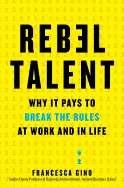
Rebel Talent - by Francesca Gino
ISBN: 0062694634Date read: 2023-07-16
How strongly I recommend it: 4/10
(See my list of 430+ books, for more.)
Go to the Amazon page for details and reviews.
Insights into the connection between rule-breakers and innovation. Social norms, trust, novelty.
my notes
People who are not afraid to break the rules when the rules are holding them back.
People who question their own assumptions and strongest beliefs, as well as the widely accepted norms around them, to identify more creative, effective ways of doing transcendent work.
Rule breaking is associated with innovation.
Connection between rule breaking and passion for one’s work: The two so often go together.
Novelty: seeking out challenge and the new.
Curiosity: the impulse we all had as children to constantly ask why.
Perspective: to constantly broaden their view of the world and see it as others do.
Diversity: the tendency to challenge predetermined social roles.
Authenticity: remaining open and vulnerable in order to connect with others and learn from them.
Positive ways of being in the world that may at first feel wrong.
Terms like rule breaker, nonconformity, and deviance make us think of subversive, even dangerous, individuals.
Social norms provide order and predictability in society, and have played a critical role in the evolution and maintenance of cooperation and culture over centuries.
We internalize social norms so effectively that we don’t even consider the possibility of violating them.
To do so would be embarrassing or distasteful.
Violators tend to be punished with gossip, derision, and rumors .
Those who subvert norms and expectations may be more likely to attract our admiration.
Wealthy people sometimes dress very badly to demonstrate superiority.
Power is typically associated with lack of constraint, and we think of powerful people as generally having the freedom to behave as they wish.
Those who feel powerful often act without fear of negative consequences.
Much of what we “know” is really only trust in someone else’s knowledge.
When we become comfortable with the current state of affairs, we experience any diversion from the status quo as a loss.
Novelty compels both humans and animals to engage with the unfamiliar.
Human groups that migrated the farthest from Africa had more of the genes linked to novelty seeking.
Biological propensity to experience mysterious new places.
When workers were assigned a greater variety of tasks, their productivity improved. Variety acted as a motivator.
The happiness people experienced after an unexpected kindness (such as a gift) lasted longest when the act was anonymous.
For an experience to be exciting, it needs to be more than novel - it also needs to be challenging.
Novelty is more important than stability.
Psychologists call this kind of experience “self-expansion.”
When we engage in novel activities and acquire new skills, our sense of who we are expands, as does the number of traits we use to describe who we are.
This, in turn, heightens our confidence that we can accomplish our goals, even when we’re outside of our comfort zone, and it also increases our commitment to reaching our destination, no matter how tough the road.
Asking for advice increases rather than decreases how competent we are perceived to be.
Speed daters who ask more questions get more second dates.